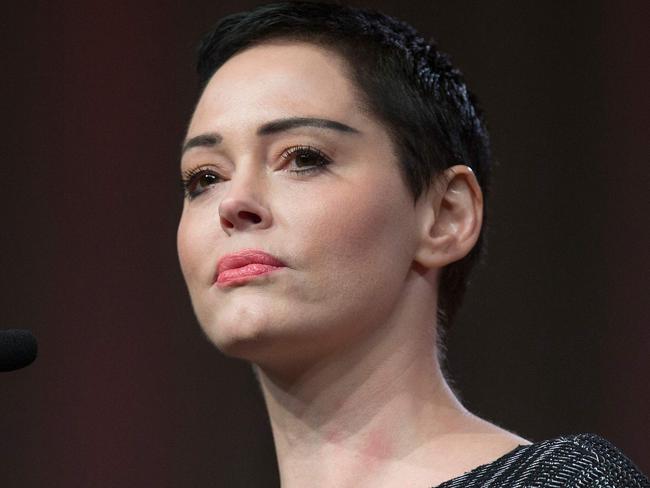Why this photo shoot didn’t make me feel empowered
IT LOOKS like pretty much any other steamy photoshoot with a nude model. But we are meant to believe this is something more.

OPINION
A PHOTO shoot of women posing naked in Sports Illustrated Swimsuit magazine has drawn criticism for trying to market the #MeToo movement and it’s not hard to see why.
The “In Her Own Words” picture spread featuring models like Paulina Porizkova, Sailor Brinkley Cook and Australia’s own Robyn Lawley was pitched as allowing them to “celebrate more than just their bodies”.
An all-female team worked on the project and the models, who have been vocal in their support of feminism and positive body image, were allowed to choose the words written on their bodies.
Editor MJ Day told Vanity Fair the 2018 issue reflected a change in thinking at the magazine that sought to involve the models as participants, not simply objects.
Ms Day said she wanted the images to be a place where different standards of beauty could be celebrated, and saw connections between the #MeToo movement and her own work.
“It’s about allowing women to exist in the world without being harassed or judged regardless of how they like to present themselves,” she said.
“That’s an underlying thread that exists throughout the Swimsuit Issue. You have Harvard graduates, you have billion-dollar moguls, you have philanthropists, you have teachers, you have mothers — you have a full range of women represented in the alumnus of this magazine, and not one of them failed because they wore a bikini.”
ICYMI: The women of #SISwim 2018 "became a canvas...to share their truth." https://t.co/N4LD3BhjUp pic.twitter.com/Sa0KsOLpNh
— SI Swimsuit (@SI_Swimsuit) February 7, 2018
This style of female empowerment is not new. Celebrities such as Kim Kardashian and Emily Ratajkowski have built careers on using their naked bodies as a form of expression — which they maintain creative control over.
In a similar vein, last year former Neighbours star Caitlin Stasey posed naked to launch a website that celebrates female sexuality.
This style of feminism appeals to some women and not to others. Regardless, as one of the models, Paulina Porizkova, suggests: “You shouldn’t be ashamed of your body, no matter what age you are.”
Model Robyn Lawley adds: “We have stretch marks. We have rolls. We have cellulite. That’s all part of our bodies.”
These are women who are not afraid to call themselves feminists and its admirable they are not afraid to present themselves as strong women — there are many others who are still uncomfortable about doing this.
But apart from the obvious observation that none of these women appear to have stretch marks, rolls or cellulite, this is still a magazine aimed at men. The pictures depicting the beauty of the female form are designed to appeal to them. The photos still seek to be “sexy”, as Ms Day acknowledges.
A quick scroll through Sports Illustrated Swimsuit’s Twitter feed makes it clear that showing hot women half naked in swimwear is how they sell magazines.
ROOKIES! ROOKIES! ROOKIES! https://t.co/mA0NSjus4k pic.twitter.com/kQ8dDXH1AX
— SI Swimsuit (@SI_Swimsuit) February 8, 2018
Follow us on Flipboard for all things #SISwim 2018! https://t.co/4a9qxFI642 pic.twitter.com/dwjZEgrdBf
— SI Swimsuit (@SI_Swimsuit) February 7, 2018
OWN IT. #SISwim 2018 https://t.co/3R7wEsJYqH pic.twitter.com/qxBmWY3uHI
— SI Swimsuit (@SI_Swimsuit) February 9, 2018
Like other businesses that have tried to sell their products by tapping into social movements (we’re looking at you Pepsi) or to present an ad as something more than just a slick advertising campaign, it can come off as cynical, no matter how sincere the original intention was.
Making powerful women an object of men’s desire could be seen as a positive step but as empowering as it may have been for the women involved, the context in which they were produced make the black and white images just look like the same-old, same-old, simply repackaged to tap into current sentiment around female empowerment.
Change is difficult and perhaps this photoshoot will be the beginning of a positive, gradual evolution at the magazine to include more input from women. If that’s what happens it is a good thing and should be acknowledged.
But celebrating the female form and exposing the system that keeps rapists in power are two different things. Associating this shoot with the #MeToo movement just doesn’t feel right.
These perfect, airbrushed photos are a world away from the anger and pain we see etched in the faces of the women at the forefront of the movement.
Those women have suffered. They have been treated as objects to be used and discarded. It’s hard to imagine that posing naked with words scrawled on their bodies would make them feel better or somehow relieve the painful memories of what they’ve been through.
This photoshoot certainly didn’t make me feel empowered. It made me angry that a campaign as complex and emotional as #MeToo was being distilled into black and white images of naked women, as though that could come close to expressing the genuine heartbreak and passion that have driven the movement.
The abuse that sparked the #MeToo campaign has cost women their lives, killed careers and driven countless human beings into despair.
We may find it easier to admire an airbrushed image of female empowerment than to look at the pained faces of women who have been deeply damaged by their experiences — it’s tempting to want to find beauty in something so genuinely horrific.
But the reality is, this is an ugly topic for many women. As much as we want to be positive and feel better about it, sometimes reality cannot and should not be sugar-coated.


